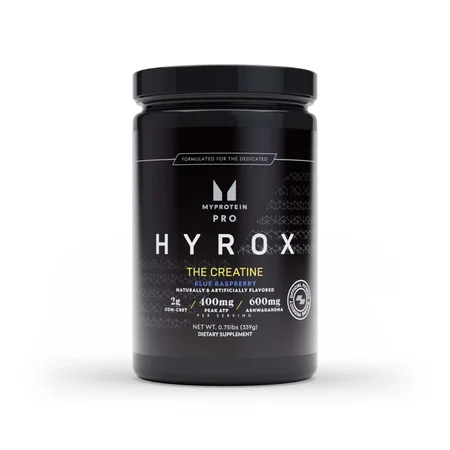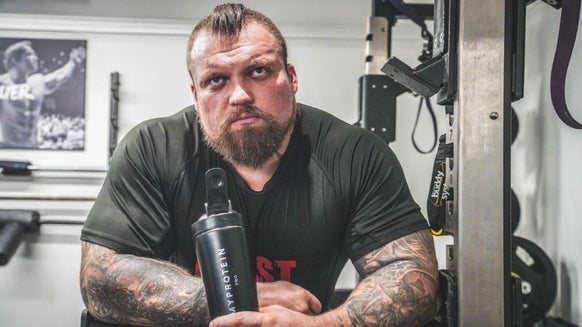
As one of the most well-researched supplements on the sports nutrition market, creatine is very popular among bodybuilders and fitness enthusiasts alike. This powerful compound has proven benefits for supporting high-intensity performance and recovery, helping you build muscle over time.
As this powerhouse supplement gains attention, a common question continues to spark debate: Should you cycle creatine? Cycling refers to taking intentional breaks from supplementation for a set period of time.
Current research does not support the idea that cycling is necessary to maximize effectiveness, as studies show creatine to be effective when taken consistently. That said, some people still choose to cycle creatine based on personal preference.
Before discussing the concept of a creatine cycle, let’s review some of the basics, including benefits, dosing, and common questions.
Jump to:

Understanding Creatine
We already know creatine is a super popular sports nutrition supplement. Let's look at how exactly it works, its benefits, and how you should be taking it.
What does creatine do?
Creatine supports muscle growth by increasing the availability of adenosine triphosphate (ATP), the primary energy source inside muscle cells.
ATP gets used up quickly during intense exercise. When this happens, your body uses creatine stores (stored as phosphocreatine) to help create more ATP. Around 95% of the body’s creatine stores are found in skeletal muscle, where it plays a direct role in fueling strength- and power-based movements.¹
When you supplement with creatine, you raise the levels of creatine stores in the body, thus accelerating the regeneration of ATP. This allows muscles to maintain performance for longer periods, which, over time, can support higher training intensity, heavier lifts, and greater overall training volume.²
Creatine also draws water into muscle cells, a process known as cell volumization, which may help support protein synthesis and contribute to muscle development when paired with consistent resistance training.
What are the benefits of taking creatine?
Creatine boasts a wide range of benefits when taken consistently. Arguably, the most well-known is its ability to enhance exercise performance, leading to increased strength and lean muscle mass over time.
The supplement has also been shown to improve disorders of creatine metabolism or transport and age-related muscle loss (sarcopenia).¹
The most researched form of creatine is creatine monohydrate, which has consistently been shown to enhance muscle growth, boost strength, and support overall exercise performance.
Recent research also suggests creatine may even have benefits beyond fitness, including potentially improving brain health and cognitive processing.³
In older adults, creatine can help with fatigue resistance and has been shown to increase strength, muscle mass, bone density, and daily activity performance.²
Finally, creatine has even been shown in several studies to have a positive effect on mood.
According to the Journal of the International Society of Sports Nutrition, creatine has been shown to improve mood and alleviate symptoms of depression in young women.⁴
Additionally, another study demonstrated that creatine boosted mood in patients with Parkinson's Disease.⁵ Creatine was also shown to reduce mental fatigue in healthy individuals and improve mood and reduce fatigue in sleep-deprived individuals in a clinical trial published in the Journal of Psychopharmacology.⁶
Dosing & Safety

How much creatine should you be taking?
Before we can assess the creatine cycle, let's first look at how much creatine you should be consuming.
A typical maintenance dose is 3–5g per day. Some start with a loading phase of ~20g/day for 5-7 days to saturate muscles faster, and then reduce their dose for the maintenance period.
However, while loading will likely make you see results faster, it is not necessary, and you will still see results if you start taking creatine at the maintenance dose; it will simply take longer.
Generally, you should not exceed 20g of creatine per day.
When should you take creatine?
Creatine can be taken pre- and/or post-workout, so really, any time you like. It's not a stimulant, so you can also take it at night if you wish.
Additionally, you can split your dose and take half before your workout and half after to spread it out throughout the day. It really is up to you when you choose to take it, provided you stay within the recommended daily dosage.

When Is The Best Time To Take Creatine?
Before working out, or after? Does it even matter?...
Is taking creatine safe?
Taking creatine is currently considered safe and ethical.² When taken in appropriate doses, creatine is likely safe to take for up to five years.⁹ And just like with any supplement, you'll want to ensure you choose a creatine that follows recommended manufacturing practices and goes through third-party testing to ensure quality, like Myprotein's Creatine Monohydrate Powder.
What are the negative effects of creatine?
According to the research, there are no proven negative health effects for healthy individuals when taking creatine, both short-term and long-term. The health risks demonstrated applied only to those who were already diagnosed with specific health conditions like bipolar disorder or renal health disorders. For the general population, there are no known negative side effects of supplementing with creatine.²
What is the Creatine Cycle?

The term "creatine cycle" refers to a pattern of taking creatine for a set period, followed by a short break. While some people use this approach, current research shows that cycling is not necessary for creatine to be effective. Whether you supplement consistently or cycle, your muscles can still benefit from increased creatine stores and improved performance.
The Loading Phase
When taking creatine, many will begin with a loading phase. The loading phase consists of taking a higher amount of creatine per day to initially saturate your muscle cells with the supplement. This promotes a quicker response from your body, meaning you'll see benefits and gains faster.
A typical loading phase is 20g of creatine a day. An easy way to do this is to take 10g pre-workout and 10g post-workout, normally added to your protein shakes. The loading phase typically lasts one week.
Once the loading phase is complete, you move on to the maintenance phase, where you simply take the standard 3-5g of creatine a day to maintain results.
The loading phase is not a requirement and is separate from the concept of cycling creatine. If you begin supplementing creatine at the maintenance dose of 3-5g a day, you'll still see results; it will likely just take longer.

The Creatine Loading Phase | Is It The Best Way To Gain Muscle?
Should you try a loading phase?...
The Creatine Cycle
If you've completed a loading phase, it is then time to cut back on your daily intake. After one week of loading, you should drop to consuming 3-5g of creatine per day.⁷ Once it's been a total of eight weeks of supplementing with creatine, some opt to "cycle" and take a break from creatine.
If you're ceasing supplementation to give your body a break, you should pause for anywhere between one and two weeks (preferably two weeks) before beginning to take creatine again.
Why consider taking a break from creatine?
Earlier research and anecdotal recommendations suggested that cycling creatine—taking it for a set period, then pausing—might be necessary to maintain effectiveness. This idea was based on the assumption that continuous supplementation could reduce responsiveness over time.
However, more recent studies now show that continuous creatine use at recommended doses is safe and effective⁸ and cycling is not required to maintain elevated muscle creatine stores.
Some people still choose to take breaks for personal preference, to reassess training, or to adjust dosing. After a short pause, muscle creatine levels gradually return to baseline, and supplementation can be resumed without losing benefits.
In short, cycling is optional, and consistent creatine use provides the same long-term performance and muscle-building benefits.
Should you cycle creatine?
The answer is: Only if you want to, but you certainly don't have to.
You do not have to cycle your creatine to reap maximum benefits from the supplement. But if you want to give your body a break, you most certainly can.
Take Home Message
Creatine is a super well-studied supplement that supports strength, high-intensity performance, and muscle growth when taken consistently. Current research shows that cycling creatine—taking breaks from supplementation—is not necessary to see benefits, though some people may choose to do so.
The key is to take creatine regularly, combine it with proper training and nutrition, and stay within recommended doses. With this approach, creatine can be an effective part of your routine to enhance performance and support muscle development.
Check out our range of creatine products to find the option that works best for you.
READ THESE NEXT:

Creatine Capsules vs. Powder | Which Should You Choose?
The difference between capsules and powder is not whether they work, but how you...

Creatine HCL vs. Monohydrate | Which Is Better?
What is the difference between creatine HCL and creatine monohydrate, and which ...

Can You Take Creatine & BCAAs Together?
Spoiler alert: yes. And here's why it's a good idea....

- Antonio, J., Candow, D. G., Forbes, S. C., Gualano, B., Jagim, A. R., Kreider, R. B., Rawson, E. S., Smith-Ryan, A. E., VanDusseldorp, T. A., Willoughby, D. S., & Ziegenfuss, T. N. (2021, February 8). Common questions and misconceptions about creatine supplementation: What does the scientific evidence really show? Journal of the International Society of Sports Nutrition. Retrieved November 19, 2022, from https://www.ncbi.nlm.nih.gov/pmc/articles/PMC7871530/
- U.S. National Library of Medicine. (n.d.). Creatine: Medlineplus supplements. MedlinePlus. Retrieved November 19, 2022, from https://medlineplus.gov/druginfo/natural/873.html
- Creatine. Mount Sinai Health System. (n.d.). Retrieved November 19, 2022, from https://www.mountsinai.org/health-library/supplement/creatine
- Allen, P. J. (2012, May). Creatine metabolism and psychiatric disorders: Does creatine supplementation have therapeutic value? Neuroscience and biobehavioral reviews. Retrieved November 19, 2022, from https://www.ncbi.nlm.nih.gov/pmc/articles/PMC3340488/
- Cooper, R., Naclerio, F., Allgrove, J., & Jimenez, A. (2012, July 20). Creatine supplementation with specific view to exercise/sports performance: An update. Journal of the International Society of Sports Nutrition. Retrieved November 19, 2022, from https://www.ncbi.nlm.nih.gov/pmc/articles/PMC3407788/
- Mayo Foundation for Medical Education and Research. (2021, February 9). Creatine. Mayo Clinic. Retrieved November 19, 2022, from









